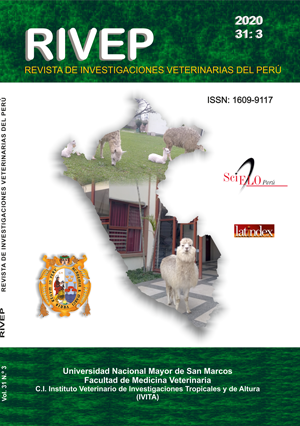Effectiveness of three commonly used anthelmintic principles against gastrointestinal nematodes in Colombian horses
DOI:
https://doi.org/10.15381/rivep.v31i3.16206Keywords:
anthelmintic, horse, deworming, gastrointestinal helminth, parasitism, resistanceAbstract
The aim of this study was to determine the effectiveness of three anthelminthic principles commonly used in horses in the Valle de Aburrá, Antioquia (Colombia), using the faecal egg count reduction test (FECTR). A cross-sectional study was carried out in 143 horses with initial counts of >100 eggs per gram of faeces (EPG). Three anthelminthic principles (fenbendazole [FEN], ivermectin [IVM], and pyrantel pamoate [PYR]) were evaluated. It was found that most of those in charge of the animals did not remember the product used in the last deworming (27.9%; 40/143); that the use of IVM (25.2%; 36/143) and FEN (23.1%; 33/143) was common in the study population; and, that the IVM is the active principle with the greatest effectiveness in the study population (82.7%), followed by the PYR (65.8%). None of the evaluated active principles showed to be effective against parasites that produce Strongylus-type eggs, while the IVM and the PYR showed to be still effective for the control of Oxyuris equi. This allows to suspect the development of anthelminthic resistance in gastrointestinal nematodes that affect horses in the study area.
Downloads
Downloads
Published
Issue
Section
License
Copyright (c) 2020 Jhonny Alberto Buitrago Mejia, Nathalia Maria del Pilar Correa-Valencia

This work is licensed under a Creative Commons Attribution-NonCommercial-ShareAlike 4.0 International License.
AUTHORS RETAIN THEIR RIGHTS:
a. Authors retain their trade mark rights and patent, and also on any process or procedure described in the article.
b. Authors retain their right to share, copy, distribute, perform and publicly communicate their article (eg, to place their article in an institutional repository or publish it in a book), with an acknowledgment of its initial publication in the Revista de Investigaciones Veterinarias del Perú (RIVEP).
c. Authors retain theirs right to make a subsequent publication of their work, to use the article or any part thereof (eg a compilation of his papers, lecture notes, thesis, or a book), always indicating the source of publication (the originator of the work, journal, volume, number and date).



